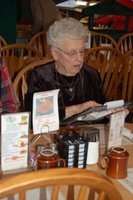Dare we eat fat?
 A study just came out in the American Journal of Epidemiology by some of the same researchers whose research last week actually found no association between red meat and breast cancer. This one, however, isn’t receiving nearly the media fanfare.
A study just came out in the American Journal of Epidemiology by some of the same researchers whose research last week actually found no association between red meat and breast cancer. This one, however, isn’t receiving nearly the media fanfare. It was another dredge through the Nurses Health Study database looking for correlations. Remember, the value of these studies is not that we can base healthcare decisions on any association, regardless of how impressive or intuitively correct it might appear. We have to wait until there’s a body of research to track down the potential cause and effect — if there even is one somewhere in the correlation — and clinical evidence to demonstrate that it is valid and biologically meaningful. Associations among data on large populations don’t mean anything, and certainly not for us as individuals, until there’s been all of the necessary follow-up research to pursue various hypotheses. More often than not, initial links prove dead ends.
But when researchers can’t even find a valid correlation among a group of people between a factor and a disease, try as they might, then we can relax and stop worrying because there’s no public health threat with that factor to even concern ourselves with.
So, sorting through twenty years of data on 80,375 women, with 3,537 cases of postmenopausal breast cancer they found no association between the fat — nor any specific type of fat — the women ate throughout their adult lives and postmenopausal breast cancer (the most common type). Nor did they find any difference in the women’s risks by the hormone receptor status of the cancers. Meaning, that popular fears about supposed hormones in fatty foods, just as in red meat, causing hormonally-driven breast cancer are insupportable.
While the results are consistent with other studies, as a Reuters Health article noted, the reluctance to dare let people think that it is okay to eat or be fat was evident. It made unsettling noises that some past studies had “suggested” an association between high fat diet and breast cancer. Few readers probably tracked down the research being referred to and found the weak meta-analysis from 1993 and data dredges that failed to come up with meaningful correlations, such as 6% to 25%, nonfindings for these types of studies.
But what you may find especially intriguing about today’s study is that women with those higher waist measurements (>35 inches) we’re all being led to fear, had significantly lower incidences breast cancer. And among women with insulin resistance, a precursor to diabetes, those who ate higher-fat diets correlated with lower breast cancer risks. There again, this association is nothing to change our diets over thinking it will prevent cancer, but perhaps it will lessen fears that eating “bad” foods is going to give us breast cancer. As oncology doctors, the American Cancer Society, the National Institutes of Health and other experts note, most women who develop breast cancer have no identifiable risks factors, other than being women over 50, and fattening foods are nowhere on their lists of potential risk factors.
If this were the only such study to come up with this, we should be skeptical. But it isn’t. For more than a decade, population studies have found no evidence of a relationship between any dietary fats and the risk for breast cancer. For example, a 1996 review of seven prospective studies in four countries, of 337,819 women published in the New England Journal of Medicine found that the total calories, total fat, cholesterol, or type of fat the women ate had no bearing on breast cancers. And the body of clinical evidence is even stronger, such as the country’s largest, longest, and most comprehensive clinical intervention trial ever conducted on low-fat eating. [Stay tuned.]




<< Home